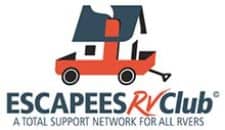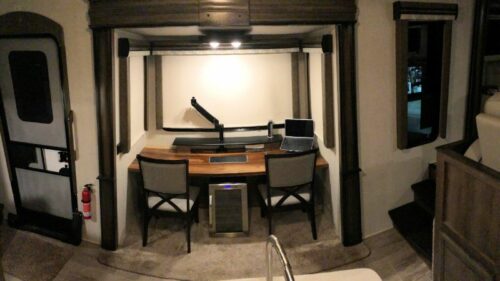Looking for tips on boondocking etiquette?
Well, here’s how to boondock – and make everyone hate you.
DUMP YOUR GRAY WATER WHEREVER YOU WANT
If you want to wake up with brown bags of questionable substances on your doorstep, then sure, dump your gray water in your campsite.
Gray water stinks. It can reek just as badly as black water. And when you dump stinky water on dirt, the dirt stinks, too.
In remote locations, such as BLM land, dumping gray water onto the ground is allowable. If you must dump your gray water, follow these rules:
- The fresher the water, the more agreeable the scent. Don’t allow dirty water to fester in a tank for weeks before dumping.
- Don’t dump at the campsite itself. Dump your holding tank into a portable tank, then wheel it away.
- Dump the water at least 100 yards from any other water sources, like rivers, ponds or springs.
- Don’t dump water that has questionable chemicals, such as harsh cleaners or bubbly surfactants.
LET YOUR DOGS BARK TO THEIR HEARTS’ CONTENT
Man’s best friend can quickly become man’s worst enemy at 2:00 a.m. Don’t let your dogs yip, yap, ruff, roar, bark during quiet hours.
If barking is a concern, then do as this author suggested: invest in a bark collar that discourages barking.
Closing the blinds and playing soft music to drain out the noise of the neighbors can also help quiet the barking.
Dogs make camping a lot of fun! Don’t ruin their reputation by allowing unruly pets to give your beloved fur-friends a bad name.
Oh, and if your pets are prone to running around, you may need to keep them on a tether.
PARK LIKE IT’S A DRIVE-IN THEATER
You know the best thing about boondocking? The alone-ness. The solitude. The chance to stretch or enjoy the silence – or roar into the abyss, if that’s your thing.
And nothing ruins that peacefulness faster than peeking out your window and seeing not a mountain, not a cactus, not a stream, but a peeling vinyl decal and some tiki torches.
The basic rule of boondocking is to park as far away as reasonably possible. In crowded areas, don’t get so close that you can overhear normal conversations. That just turns the area into a cheaper, dustier KOA.
Need a number? Aim for 150-200 feet where possible.
If you’re camping in a crowded dispersed area, just orient your camper in such a way that you’re not staring into someone else’s site.
OVERSTAY YOUR WELCOME
Boondocking is not an excuse to squat on public land. Most public boondocking land, such as BLM land, caps your stay at 14 days. After that, you have to move at least 25 miles away, and you can’t return to your first campground for 28 days.
It (almost) goes without saying you should abide by regulations about length of stay. But it’s more than that. You’re camping, not squatting.
It’s fine to extend the awning, set up the chairs, light a tiki torch or two, and enjoy the night air. But remember: You’re borrowing the land. Don’t put up fencing or “No Trespassing” signs.
And don’t erect the 8-person Coleman tent, set up the shooting range, and roll out the barbeque grill. If you spread out too far and damage the terrain, future campers might be banned from that area.
LITTER YOUR TRASH
Follow Leave No Trace principles: Leave the area cleaner than you found it. Take only pictures; leave only footprints.
SWITCH ON THE FLOOD LIGHTS
Some campers feel the need to flood the surrounding 300-foot radius with bright white halogen floodlights. It looks like the perimeter of a federal prison. And just about as welcoming.
Don’t pollute the beautiful boondocking landscape with excess light. Let the stars speak.
If you’re concerned about theft or personal safety, there are more effective methods: keyless entry pads, motion-sensing alarms, security cameras, etc.
BUILD AN (ILLEGAL) CAMPFIRE
In most boondocking locations, campfires are NOT allowed.
Campfires scar the land and consume natural resources. And they are a HUGE risk for wildfires.
The American camping ethos demands a campfire, I know. But it’s 2022, and campfires are so 1995. If you must have something to sit around, may I suggest a flame lantern?
Some dispersed or primitive camping locations will allow campfires in existing fire rings, subject to weather restrictions. Please follow local regulations.
Lastly, only use local firewood! Transporting firewood long distances or across state lines may be illegal. It can spread diseases and pests.
INVITE THE BEARS FOR DINNER
If you’re camping in bear country, you need to follow bear country etiquette! That means:
- Never leave food unattended!
- Pack all food, perfumes, and anything with a strong smell inside coolers and canisters and placing them inside your tow vehicle or RV
- Use bear canisters for any food left outside.
Don’t rely on the counterbalance method (stringing food packs 20 feet high, 10 feet away from trunk) to protect food.
Your neighbors will not appreciate a hyperphagic bear wandering into camp looking for your beef hotdogs.
USE ROAD SIGNS FOR TARGET PRACTICE
Didn’t your momma teach you anything?
Don’t shoot your gun at the roadsigns!
For that matter, don’t shoot your gun at all. Save the shooting for hunting season. Shotgun shells and rifle casings and bullets can harm wildlife who ingest them.
INDULGE YOUR INNER FAST N’ FURIOUS DRIVER
Boondocking areas are often full of pets, kids, and retirees. Don’t risk your neighbor’s safety by driving along washboard roads at 35 mph!
Assume the safe driving speed within the dispersed camping area is 10 mph. Driving faster than 10 mph risks everyone’s safety (including your own). Plus, it kicks up clouds of dust.
ASSUME EVERYONE WANTS TO BE YOUR FRIEND
If you’re an ESFP (super-social butterfly), then feel free to extend an invite to your fellow campers for a beer and fun evening!
But please don’t assume everyone else wants a rustic rave at 10:00 p.m. Don’t be hurt if your neighbor does nothing more than casually wave in the morning. Some people camp for the solitude.
Invite whoever you want, but never drop in without permission. Some people don’t know how to tell you to go away politely. If all you hear in response to your hilarious story is an “uh oh” and “you don’t say,” then take that as a subtle hint to make tracks.
ESTABLISH A NEW CAMPSITE
Many dispersed camping areas are located in fragile habitats. In the desert southwest, for instance, boondocking camps are often surrounded by a high-altitude desert biome, which is held together by a biological soil crust.
When you step on this crust, it breaks down the fungi and lichens – and it may take decades for them to recover! And without this protective cover, nutritious topsoil gets swept away by the wind, and rain sheds too quickly.
You’re not Daniel Boone. Don’t blaze new trails or establish new campsites. What was good enough for the other 1,472 campers before is good enough for you.
POOP ON THE GROUND
This isn’t a pleasant subject, I know. But you know what’s more unpleasant? Stepping in sh*t. From your neighbor.
Digging a cat hole is pretty easy. Dig 6-8 inches deep and 4-6 inches wide. Make your deposit. Cover it up and tamp it down. All done!
Do not leave poop – from human or animal – on the surface of the earth. It attracts creatures, spread diseases, contaminates water sources, doesn’t decomposite, and may end up on someone’s shoe.
GENTLEMEN, START YOUR GENERATORS!
Standard quiet hours are 8-8. This is universal. In the winter, quiet hours are extended to all dark hours.
Unless you are in danger of losing life or limb, don’t start or run your generator after 8:00 p.m. or before 8:00 a.m.
For that matter, why run your generator at all? Why not invest in solar power and avoid the noise, fumes, fuel and hassle?
Sames rules for blasting loud music, too. In fact, some of your neighbors might prefer the throaty rumble of a generator to whatever musical genre you prefer.
Andy Herrick is a blogging nerd, #8 Enneagram, wannabe bread baker, INTJ, RV industry professional, and small business entrepreneur. He can be found hanging out with his lovely wife and family, skiing, cycling, climbing, hiking, and convincing anyone who will listen why dogs aren’t really that great of pets. Also, he runs this website.
-
Andyhttps://changingears.com/author/andrew-herrick/
-
Andyhttps://changingears.com/author/andrew-herrick/
-
Andyhttps://changingears.com/author/andrew-herrick/
-
Andyhttps://changingears.com/author/andrew-herrick/








